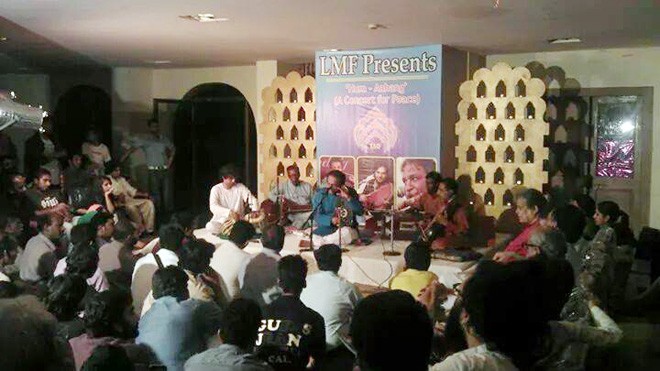
Lahore Music Forum continues on the journey of promoting classical music with a recent concert by Raza Ali Khan and Shafqat Ali Khan

Lahore Music Forum resumed their activities which are mainly the holding of classical music concerts by playing hosts to Raza Ali Khan and Shafqat Ali Khan.
Since the artistes are from two countries, India and Pakistan, it was billed as an Indo Pak concert.
It was quite an adventure reaching the venue of the concert, the Punjab Institute of Language and Culture because the entire Gaddafi Stadium Complex was filled with parked buses, coaches, vans, motor cycles and people in their hundreds armed with sticks moving menacingly all over, blocking the entrances to the various cultural and sports venues situated in the area. There was also a large presence of the police and quasi security personnel; it appeared that the place had been converted into the parking lot and launching pad of the political protest that had been organised at the Liberty Round About.
Once inside, it was not possible to rid oneself of the half unleashed mayhem that existed outside the walls of the small auditorium. As it has often happened, the charged atmosphere on the street and the slightly dispassionate approach of the arts come face to face and the more trigger happy amongst us are seen to tilt more towards an instant and knee jerk reaction to events. This tit for tat response is considered by them to be more blood curdling and exciting and lays the framework for the relevance of the arts to the action on ground. Many claim that the once and twice removed definition of arts is not appropriate for a timely response and artistic intervention to have an impact. But probably it is more important to sing, act and dance irrespective of that as some of the cities like London and Stalingrad did even in the most violent of times.
Many in Lahore consider Raza Ali Khan to be the son of Lahore. When he first sang in the city probably twenty yeas ago on Fort Road, the entire open air area was jammed to capacity in anticipation of the performance. People had not only come to listen to Raza Ali Khan, they wanted to be reminded of his grandfather, the great Ustad Barrey Ghulam Ali Khan who spent his formative years in Lahore. It is said that in those times when Barrey Ghulam Ali was spotted as a very promising youngster, he did not rest on sheer talent alone but knew that he had to hone it with incessant riyaz. It is said that he did his riyaz next to the wall of the Fort adjacent to the ground which was then known as Ram Leela ground and now is called Ali Park. Probably in the years leading up to partition, theatre and shows were staged in this place just outside the walled city, mainly centering round quasi religious themes in a form called Ram Leela.
Sometimes in the late 1950s or early 60s Josh Malihabadi read his famous poem "Hamarey Hain Hussain" to a packed Ram Leela ground and since then it has been called Ali Park. This area between the Fort and the walled city has been the hub of cultural activities for a long period of time -- right up to the modern period, if the latter starts with the post partition era of the subcontinent.
People are still alive who saw and heard Barrey Ghulam Ali Khan in the formative years and still remember with grief the time when he was forced almost to leave the country. But despite his physical dislocation he could not be dislodged from the hearts and the memories of the people of Lahore and they always saw him as their very own.
Raza Ali’s father Meeno Khan (Munawwar Ali Khan) too spent his childhood in Lahore and then migrated with the father to Bombay and Calcutta where they performed extensively all across India to much acclaim. His accompanying voice can be heard in many of the recordings of Barrey Ghulam Ali Khan, especially in the last years when he was partially incapacitated due to illness. Similarly the accompanying voice of Raza Ali Khan is also heard in the recordings of Munawwar Ali Khan. The latter died suddenly while performing and since then Raza Ali Khan has been carrying the mantle on his own or with Jawad Ali Khan. One could hear the overtones of the gaiki of Barrey Ghulam Ali Khan in those renditions which carries this extra appeal for the connoisseurs of music.
Ustad Barkat Ali Khan, Barrey Ghulam Ali’s younger brother, too lived near the mazar of naugaza and his baithaks was a haunt of the music lovers in the city. He was then recognised as the leading thumri and dadra vocalist who was also experimenting with the evolving form of the ghazal in the late 1940s and the early years after partition.
Shafqat Ali Khan is now a mature vocalist and given a good audience unfolds the raag with the composure that is expected of an artiste of his stature. At times he is pushed by an expectant audience to rush into demonstration of virtuosity but when there is no such expectation he is better placed to unfold the very compacted vocal design that he is quite capable of without brimstone and fire.
It is a good sign that the Lahore Music Forum has continued on the journey of promoting the classical forms of our music. It is also satisfying that they find venues sharing their vision. A private hotel, National College of Arts, the Alhamra, Punjab Institute of Language and Culture, Hust-o-Neest and Nairang Galleries have been some of the venues which have hosted their concerts.